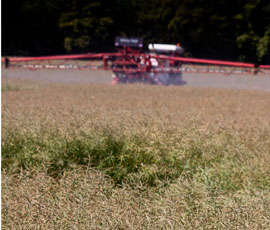Importance of rotational hygiene increasing in OSR production

Managing oilseed rape volunteers throughout tight OSR rotations is becoming increasingly important and varietal resistance to pod shatter could be a key consideration in reducing numbers, warns an expert.
Speaking at the AICC annual technical conference, Openfield arable technical manager David Leaper told delegates that crop diseases were being exacerbated by high numbers of volunteers.
“There have been increasing reports of growers complaining about high numbers of volunteers and closer rotations, lower seed-rates and wider row spacing all conspiring to make the situation worse,” said Mr Leaper.
Work carried out by Mr Leaper on pod shatter at harvest involved two consecutive years of conventionally managed commercial demonstration trials where 12 metre strips of different varieties were set up on heavy land in Nottinghamshire. The strips were then harvested with a commercial combine and stubbles assessed for volunteers post-harvest.
“In 2011, results showed there were varieties that produced much higher levels of volunteers, such as Dimension. At the other end of the scale, hybrid varieties such as Expower, Excalibur and Extrovert gave rise to very few,” noted Mr Leaper.
Mr Leaper points out that the implications of these results are pronounced, with the higher numbers of established volunteers providing a green bridge for aphids carrying turnip yellows virus (TuYV) and diseases such as powdery mildew.
“There is also potential for the spread of light leaf spot on those volunteers and verticillium wilt and phoma have the potential to carry over on shed seed, so managing that seed return at harvest is vital.
“Ideally, stubbles would be left uncultivated for four weeks after harvest to reduce seed viability, but with pressure to manage other key weeds such as blackgrass, this may not be practical and a stale seed bed will be produced,” said Mr Leaper.
The implementation of technology such as Clearfield and GM herbicide resistant oilseed rape could provide a solution in the future, but until then he urges considering shatter-resistant varieties to avoid producing mixed populations in crop.
Canopy care crucial in hitting the 5t/ha oilseed rape target

